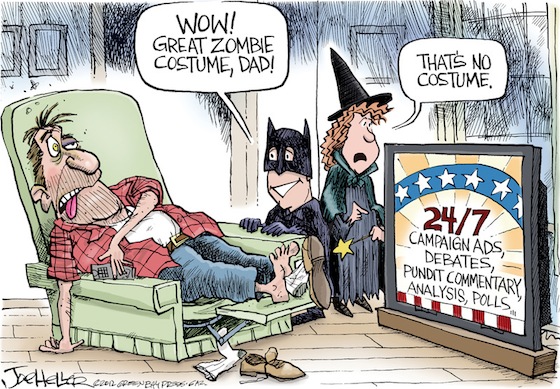http://blogs.kqed.org/mindshift/2014/10/a-problem-solving-game-for-teachers-and-administrators/
This activity empowers all stakeholders. It gives everyone an opportunity to share pain points and observations and to brainstorm solutions. By building a card deck of context-specific pain points and observations, there’s buy-in from the start. All participants have a vested interest in the cards they create. Likewise, the activity has enough structure built in to drive toward solutions.
Smartphones, tablets, e-readers — today’s students have a variety of mobile technologies at their fingertips. Here’s a look at some mobile-learning resources from Edutopia and around the web.
https://chroniclevitae.com/news/768-teaching-and-the-university-of-tomorrow
MOOC promoters continually claim that their products provide technologies that have never appeared in face-to-face classrooms. While I don’t disagree that my courses have lacked fun ways to draw molecules (because I teach in the humanities), I do find their insistence that traditional higher ed lacks technological advances to be odd. If you took the MOOC prophets seriously, it would seem that all real-time professors do is lecture to bored students. – See more at: https://chroniclevitae.com/news/768-teaching-and-the-university-of-tomorrow#sthash.RuCJxbAU.dpuf
What I believe Kelly Backer [intentionally?] misses to say is that MOOC claims to be progressive, meaning “a new mode/model” of teaching, but it relays on the old (from medieval times) values: the attempt to put “skin in the game” or pay for certificates, fails, since, according to Backer, the employers don’t care about those certificates. It is not sufficient to “move” the teaching process in the “future,” if the evaluation process remains in the medieval terms.
http://higheredmanagement.net/2014/10/22/stuck-in-the-90s-online-course-design-in-traditional-higher-education/
Of course, not all aspects of online course design require a team of specialists, a longer development time, and more funding. Some things can be done quickly, cheaply and by individuals with focused skill sets.
But technology can, when built with a deep understanding of how students learn, meet both of these needs. We can build online courses that provide students with hundreds of opportunities to test their knowledge. Using scientifically-based learning analytics, we can provide each learner with immediate, context-specific feedback. We can build software that constantly responds to each student’s cognitive and educational differences and serves up activities that address these differences.
-

Michael
-

Judith
-

Alex
-

Maria
-

Alex
-

Judith
http://blogs.kqed.org/mindshift/2014/10/survey-finds-teachers-underutilize-resources-for-digital-games-in-the-classroom/
Certain types of games are favored over others, and that duration plays a key part. “Teachers tend to use shorter form games that could be finished in a class period or just a few minutes. Because developers realize that teachers can fit a shorter form game into a classroom period, they’re going to make those games.”

http://blogs.kqed.org/mindshift/2014/06/surprising-insights-how-teachers-use-games-in-the-classroom/
The 2015 Teaching Professor Conference is the place to hear about the latest pedagogical strategies.
The cut-off date for submitting a proposal to the
2015 Teaching Professor Conference is approaching fast!
All proposals must be submitted by October 31, 2014.
The Teaching Professor Conference is known for attracting a roster of high-quality, engaging presenters; that’s why we’re asking you to be a part of next year’s event. If you have previously submitted a proposal for past conferences, we sincerely ask you to submit again. And if you have never submitted a proposal for a session or poster session, we ask that you seriously consider this opportunity to share your expertise at the conference.
The 12th annual Teaching Professor Conference will be held May 29-31, 2015 at the Sheraton Atlanta Hotel, Atlanta, GA.
Featured topical areas are:
Topical Area 1: Instructional Design
Topical Area 2: Activities that Engage Students
Topical Area 3: Teaching Specific Types of Students
Topical Area 4: Instructional Vitality: Ways to Keep Teaching Fresh and Invigorated
Topical Area 5: Teaching and Learning with Technology
Topical Area 6: Creating Climates for Learning
Topical Area 7: Faculty Development
For more information about the proposal process and how to submit your proposal, please click here: http://www.teachingprofessor.com/conference/proposals.
The Teaching Professor Conference is three intensive days of plenary sessions, preconference workshops, sessions, poster sessions, and more. Here is your chance to be a part of it in 2015.
Deadline for proposal submissions is Friday, October 31st, 2014.
Periodic Table with videos
http://www.educatorstechnology.com/2014/10/ted-ed-new-interactive-periodic-table.html
http://ed.ted.com/periodic-videos
TED-Ed launched a clickable periodic table with videos on every element. This work is a fruit of a partnership between TED-Ed and Brady Haran, the creator of the popular YouTube channel Numberphile. The purpose behind this period table is to provide students with both a refresher and a study aid to help them better understand the different chemical elements and their properties.
From: lrs_l-bounces@lists.stcloudstate.edu [mailto:lrs_l-bounces@lists.stcloudstate.edu] On Behalf Of Ewing, M Keith
Sent: Monday, October 20, 2014 11:15 AM
To: lrs_l@stcloudstate.edu
Subject: [LRS_l] Important copyright ruling
Last Friday the 11th Circuit Court of Appeals issued its ruling in Cambridge University Press et al., v. Patton (an appeal of the Georgia State Case which had been adjudicated in 2012 by the District Court in Atlanta). Nancy Sims (UMinnesota) has written an interesting and thorough summary and assessment of the ruling and its importance. See http://blog.lib.umn.edu/copyrightlibn/2014/10/11th-circuit-gsu-ruling.html. The ruling itself (all 129 pages) can be found at http://media.ca11.uscourts.gov/opinions/pub/files/201214676.pdf.
keith
Keith Ewing
Professor, Library Systems & Digital Projects
Previous IMS entries regrading copyright:
https://blog.stcloudstate.edu/ims/?s=copyright






